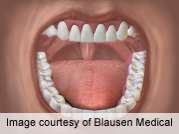(HealthDay)—For patients with oropharynx cancer (OPC), human papillomavirus (HPV) positivity is associated with improved survival after disease progression, according to a study published online June 23 in the Journal of Clinical Oncology.
Carole Fakhry, M.D., from Johns Hopkins Medical Institutions in Baltimore, and colleagues examined the risk of death after progression for patients with HPV-positive OPC relative to HPV-negative OPC. Data were collected for patients with stage III to IV OPC, enrolled onto Radiation Therapy Oncology Groups (RTOG) trial 0129 or RTOG 0522. The cohort comprised 181 patients with OPC, including 105 with p16-positive and 76 with p16-negative tumors.
The researchers found that patients with p16-positive and p16-negative tumors had similar patterns of failure and median time to progression. Patients with p16-positive OPC had significantly improved survival rates after a median follow-up of four years, compared with p16-negatve patients (two-year overall survival, 54.6 versus 27.6 percent; median, 2.6 versus 0.8 years; P < 0.001). After adjustment for tumor stage and cigarette pack-years at enrollment, the risk of death after disease progression was reduced with p16-positive tumor status (hazard ratio, 0.48) and receipt of salvage surgery (hazard ratio, 0.48) and was increased with distant versus locoregional progression (hazard ratio, 1.99).
"Tumor HPV status is a strong and independent predictor of overall survival after disease progression and should be a stratification factor for clinical trials for patients with recurrent or metastatic OPC," the authors write.
Several authors disclosed financial ties to the pharmaceutical industry, including Bristol-Myers Squibb, which partially funded the study.
More information:
Abstract
Full Text (subscription or payment may be required)
Journal information: Journal of Clinical Oncology
Copyright © 2014 HealthDay. All rights reserved.



















